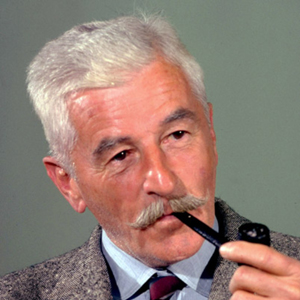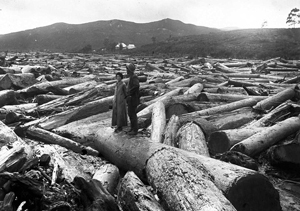
Your complimentary articles
You’ve read one of your four complimentary articles for this month.
You can read four articles free per month. To have complete access to the thousands of philosophy articles on this site, please
Heidegger
Heidegger & Faulkner Against Modern Technology
Bob James sees similarities in the two writers’ dark perceptions of industrialisation.
In December 1941, William Faulkner mailed his New York publisher the fourth and final part of a forty-thousand-word short story from his home in Mississippi. In a separate note, Faulkner apologized to the publisher for being late with the manuscript, but said “there was more meat in it than I thought.” ‘The Bear’ – soon to become the most famous of Faulkner’s short works – appeared seven months later as part of Go Down Moses And Other Stories, in May 1942.
Eleven years later, in November 1953, Martin Heidegger stood before an audience of students and teachers at the Bavarian Academy of Fine Arts in Munich, and delivered a lecture he had reworked from a talk delivered four years previously to a group of businessmen in Bremen. Published the following year in a brief collection of essays and lectures, ‘The Question Concerning Technology’ would soon become one of the philosopher’s best-read and most-talked about shorter pieces.
While the two men never met one another or, to my knowledge, never read one another’s writings, Faulkner and Heidegger shared a common distaste for the twentieth century’s technological innovations. Both stuck close to their rural homes for most of their days, shunning radios, TVs and electric appliances, and dressing for roles more like those of their neighbors of earlier times: in Faulkner’s case, a horse farmer; in Heidegger’s, a rural peasant. And both men rankled over what literary critic Leo Marx would in 1964 call ‘The Machine in the Garden’ – the banishment of the pastoral idyll by the intrusion of technology-driven consumerism.
That both, living nearly five thousand miles apart, with wildly different upbringings and without contact between or influence over one another, would arrive at essentially the same critique of technology, says a lot about the zeitgeist of the Twentieth Century.
Devouring The Wild

William Faulkner utilising some technology
Faulkner was asked by a university student in 1958 if ‘The Bear’ was his reproof of progress. “Change can destroy what is irreplaceable,” he answered. “If all the destruction of the wilderness does is to give more people more automobiles just to ride around in, then the wilderness was better.”
The bear in the title of Faulkner’s story is Old Ben, a “big old bear with one trap-ruined foot.” Old Ben, Faulkner says, is “shaggy, tremendous, red-eyed, not malevolent, but just big, too big for the dogs which tried to bay it, for the horses which tried to ride it down, for the men and the bullets they fired into it; too big for the very country which was its constricting scope.” He wanders a hundred-square-mile section of the ‘big woods’ – a “doomed wilderness whose edges were being constantly and punily gnawed at by men with axes and plows who feared it because it was wilderness, men myriad and nameless even to one another in the land where the old bear had earned a name, through which ran not even a mortal beast but an anachronism indomitable and invincible out of an old dead time, a phantom, epitome and apotheosis of the old wild life which the puny humans swarmed and hacked at in a fury of abhorrence and fear like pygmies about the ankles of a drowsing elephant.” On the lookout for Old Ben is the cental protagonist, the boy Ike McCaslin, who for two weeks each November joins a hunting party comprising his father and several other white gentlemen from town; a black helper; an Indian tracker named Sam Fathers; and a half-breed named Boon Hogganbeck. Each year, they pack up their rifles and lead their hounds deep into bear country, their aim never specifically to hunt, but “to keep yearly rendezvous with the bear which they did not even intend to kill.”
The story follows the hunt for Old Ben over several seasons. But most pertinently for us, the final part of ‘The Bear’ flashes back to the year Ike turns eighteen. We learn that the hunting party has disbanded, its annual pilgrimage ceased. Feeling nostalgic, Ike returns one more time to the big woods. What he witnesses causes “shocked and grieved amazement, even though he had had forewarning.” A lumber company has built a vast mill and is clear-cutting the old-growth forest. Smoke churns from a railroad engine, and train whistles shriek through the once-silent woods. Ike comes upon the graves of Sam Fathers and the tracker dog Lion; but his reverie is interrupted when a huge snake, “evocative of all knowledge and an old weariness and of pariah-hood and of death” suddenly glides between his legs. He leaves the graves, only to stumble into the mad Boon Hogganbeck, who sits under a gum tree eyeing the squirrels that are the big wood’s last remaining game. “Get out of here!” Boon screams. “Don’t touch them! Don’t touch a one of them! They’re mine!”
Commandeering The World

“Now that’s what I call progress!”
“Everywhere we remain unfree and chained to technology, whether we passionately affirm or deny it,” Heidegger famously says at the start of ‘The Question Concerning Technology’. Since there is no unplugging or opting out, Heidegger argues, the sole chance we stand of escaping technology’s dominion (assuming that we wish to do so) lies in philosophy. But modern philosophy, which considers technology not a monster but as a means to an end, “makes us utterly blind to the essence of technology.”
To grasp what Heidegger means here, we must turn to ancient philosophy, and specifically, unearth the root of the word ‘cause’. The word derives from the Latin noun causa, which stems from the verb cadere, meaning ‘to fall’. Thus the Romans believed that a result ‘falls’ from a previous event. The Greeks thought about cause differently – they used the word aition, ‘debt’, for cause, believing that a result was ‘indebted’ to another thing. So to Aristotle, who is famous for describing four different types of causes for something, a chalice would be indebted to: the silver from which it was made (its material cause); to the silversmith who made it (part of its efficient cause); the idea of chalice or ‘chalice-ness’ that makes it the type of thing it is (the chalice’s formal cause); and to the ends or purposes that a chalice serves (its final cause). But not all causes are created equal, says Heidegger: apart from the silversmith himself, the other three causes “owe thanks to the pondering of the silversmith.” That is, the smith’s handiwork ‘releases’ the other causes to ‘bring forth’ the chalice, like a flower bursting into bloom. According to Heidegger, this bringing-forth is the ‘primal meaning’ of cause.
Next, we learn that bringing-forth such as the smith’s is the ‘essence of technology’: “Bringing-forth, indeed, gathers within itself the four modes of occasioning – causality – and rules them throughout,” Heidegger says: “Technology is therefore no mere means. Technology is a way of revealing.” The word ‘technology’ in fact stems from the Greek techne, to make or to fashion. Heidegger affirms that “ Techne belongs to bringing-forth,” and that from even before Plato’s time “is linked with the word episteme [to know],” noting that Aristotle distinguished techne and episteme by claiming that episteme revealed things that already existed, whereas techne was about revealing things that didn’t previously exist. A homebuilder, to this way of thinking, doesn’t just build a house, he reveals it; and a homebuyer realizes it’s a house because it’s no longer concealed in its materials: it has been ‘unconcealed’. As Heidegger says, “Technology comes to presence in the realm where revealing and unconcealment take place.”
So why do we feel oppressed by technology? Because, Heidegger says, modern technology is oppressive. That is to say, modern technology’s manner of ‘revealing’ is monopolistic and imperious. “The revealing that rules in modern technology is a challenging,” he says.
For Heidegger modern technology has but one aim: to extract resources from nature in order to store them. Ancient technologies, such as the windmill, didn’t do that: rather, they used aspects of the cycle of nature and so were part of that. By contrast, modern technology ‘reveals’ the Earth as a source of uranium; the sky as a source of nitrogen; the Sun as a source of solar energy; the river as a source of hydroelectricity; the farmer’s field as a source of cheap food; the ancient temple hilltop as a tourist destination. Modern technology commands the world to ‘unlock’ itself: “Everywhere everything is ordered to stand by, to be immediately on hand, indeed to stand there just so that it may be on call for a further ordering,” Heidegger says: “We call it the standing-reserve.” All the old wonder has been driven out of things; each is a mere stock-part. Moreover, in this revealing, modern technology also commands us to conform our manner of thought to its will. So whereas the Greeks revered things, we order or compartmentalize them. Heidegger calls this mental habit which “reveals the real as standing-reserve” an ‘enframing’; and this enframing of the world is the very “essence of modern technology.” This enframing emerged in the Seventeenth Century with the rise of modern science, which “pursues and entraps nature as a calculable coherence of forces.”
However, recognizing our modern mental state can be liberating: “When we once open ourselves expressly to the essence of technology [that is, recognise our enframing], we find ourselves unexpectedly taken into a freeing claim.” At this juncture of recognition, man is free either to be “nothing but the orderer of the standing-reserve” pretending to the role of “lord of the earth”, or he is free as the Greeks were, to let “what presences come forth into appearance” – to “enter into a more original revealing and hence to experience the call of a more primal truth.” In this latter role, man plays the role of true steward of technology and “keeps watch over the unconcealment” – over technology’s revelation of the world as orderable – controlling our own thinking and will, and in the process discovering our “highest dignity” and “saving power”:
“It is precisely in enframing, which threatens to sweep man away into ordering as the supposed single way of revealing, and so thrusts man into the danger of the surrender of his free essence – it is precisely in this extreme danger that the innermost indestructible belongingness of man within granting may come to light, provided that we, for our part, begin to pay heed to the essence of technology.”
Pairing Faulkner & Heidegger
Faulkner was also asked by a student in 1958 if he wanted to win readers’ sympathy for Old Ben. The writer insisted not: “Change must alter, must happen, and change is going to alter what was,” he replied. “No matter how fine anything seems, it can’t endure, because once it stops – abandons motion – it is dead.” He said that rather, his goal was to elicit his readers’ compassion for the wild itself: “It’s to have compassion for the anguish that the wilderness itself may have felt by being ruthlessly destroyed by axes, by men who simply wanted to make that earth grow something they could sell for a profit, which brought into it a condition based on an evil like human bondage. It’s not to choose sides at all, but to be compassionate for the good, splendid things which change must destroy; the splendid, fine things which are a part of man’s past, part of man’s heritage, too. But they were obsolete and had to go.”
In ‘The Bear’ Faulkner describes the big woods in terms of which Heidegger might approve: ‘ancient’, ‘timeless’, ‘musing’, ‘eternal’, ‘markless’, ‘impervious’, ‘somber’, ‘immemorial’, and ‘impenetrable.’ And in the final part of ‘The Bear’ we can also readily imagine Heidegger’s voice being used to narrate Ike’s response to the destruction and reordering wrought on the woods by the lumber company in only two short years. Ike is ‘shocked and grieved’ by
“a new planing-mill already half completed which would cover two or three acres and what looked like miles and miles of stacked steel rails red with the light bright rust of newness and of piled crossties sharp with creosote, and wire corrals and feeding-troughs for two hundred mules at least and the tents of the men who drove them.”

Ike climbs into the cupola of a log-train’s caboose to escape the sight, but then “the little locomotive shrieked and began to move: a rapid churning of exhaust, a lethargic deliberate clashing of slack couplings traveling backward along the train, the exhaust changing to the deep slow clapping bites of power as the caboose too began to move and from the cupola he watched the train’s head complete the first and only curve in the entire line’s length and vanish into the wilderness, dragging its length of train behind it so that it resembled a small dingy harmless snake vanishing into weeds.” How reminiscent this attitude is of Heidegger’s description of a hydroelectric plant:
“It sets the Rhine to supplying its hydraulic pressure, which then sets the turbines turning. This turning sets those machines in motion whose thrust sets going the electric current for which the long-distance power station and its network of cables are set up to dispatch electricity. In the context of the interlocking processes pertaining to the orderly disposition of electrical energy, even the Rhine itself appears as something at our command. The hydroelectric plant is not built into the Rhine River as was the old wooden bridge that joined bank with bank for hundreds of years. Rather the river is dammed up into the power plant. What the river is now, namely, a water power supplier, derives from out of the essence of the power station.”
Whither The Wild & The Wonderment?
Should we ask with Faulkner, has man’s greed doomed the wilderness? And should we ask with Heidegger, has technology’s push for standing-reserve doomed nature’s wonderment?
Although not religious himself, Faulkner nonetheless allows his characters to speak in pious terms, because he lets them size up their situations in terms intelligible to the country folk of the Nineteenth Century American South. For instance, Ike McCaslin tells his cousin that God never intended anyone to own the plantation that had been set to be Ike’s inheritance – nor any land on earth:
“He told in the book how He created the earth, made it and looked at it and said it was all right, and then He made man. He made the earth first and peopled it with dumb creatures, and then He created man to be His overseer on the earth and to hold suzerainty over the earth and the animals on it in His name, not to hold for himself and his descendants inviolable title forever, generation after generation, to the oblongs and squares of the earth, but to hold the earth mutual and intact in the communal anonymity of brotherhood, and all the fee He asked was pity and humility and sufferance and endurance and the sweat of his face for bread.”
Heidegger answers the modern world in equally pious terms, with all the ethereal phrasing endemic to his writings. And despite modern technology’s dominion over rivers, fields, skies, and mountains, he says there is still a way man can be ‘astounded’: “in the realm of art” and “in poetry, and in everything poetical.” For, as Heidegger’s hero Hölderlin wrote, and as Heidegger quotes, “Poetically dwells man upon this earth.”
© Bob James 2018
Bob James holds a Masters in Philosophy from Georgetown University. He lives in Washington, DC, with his wife Ann, and a decidedly empiricist cat named Berkeley.









